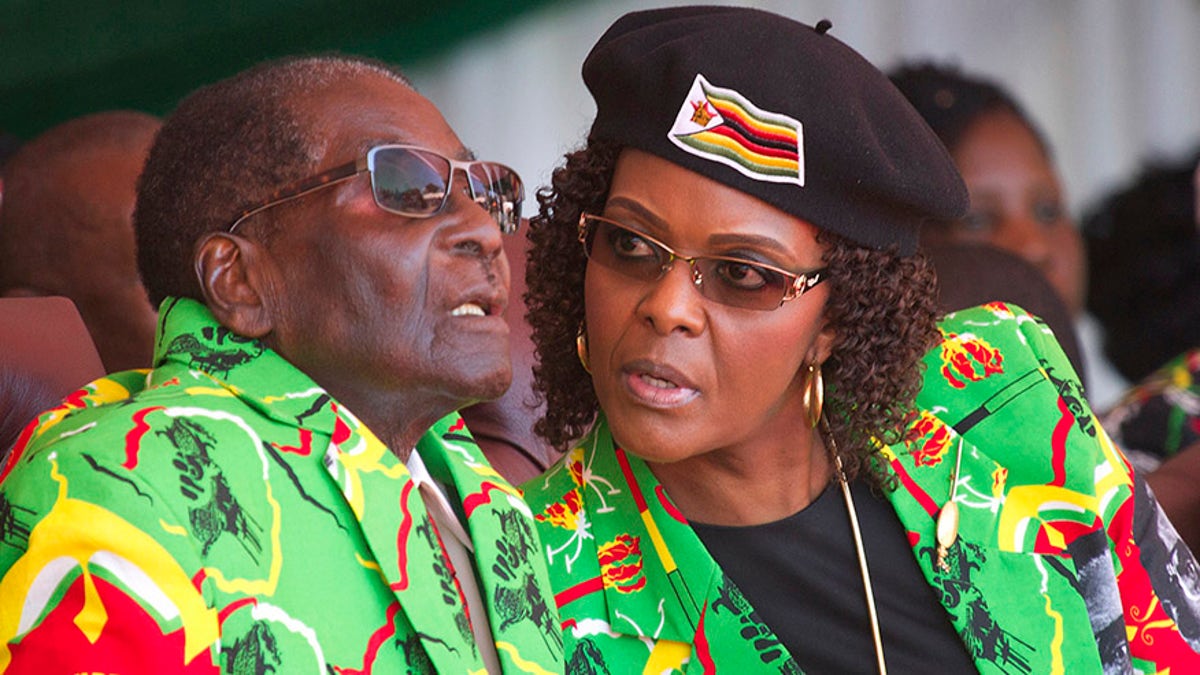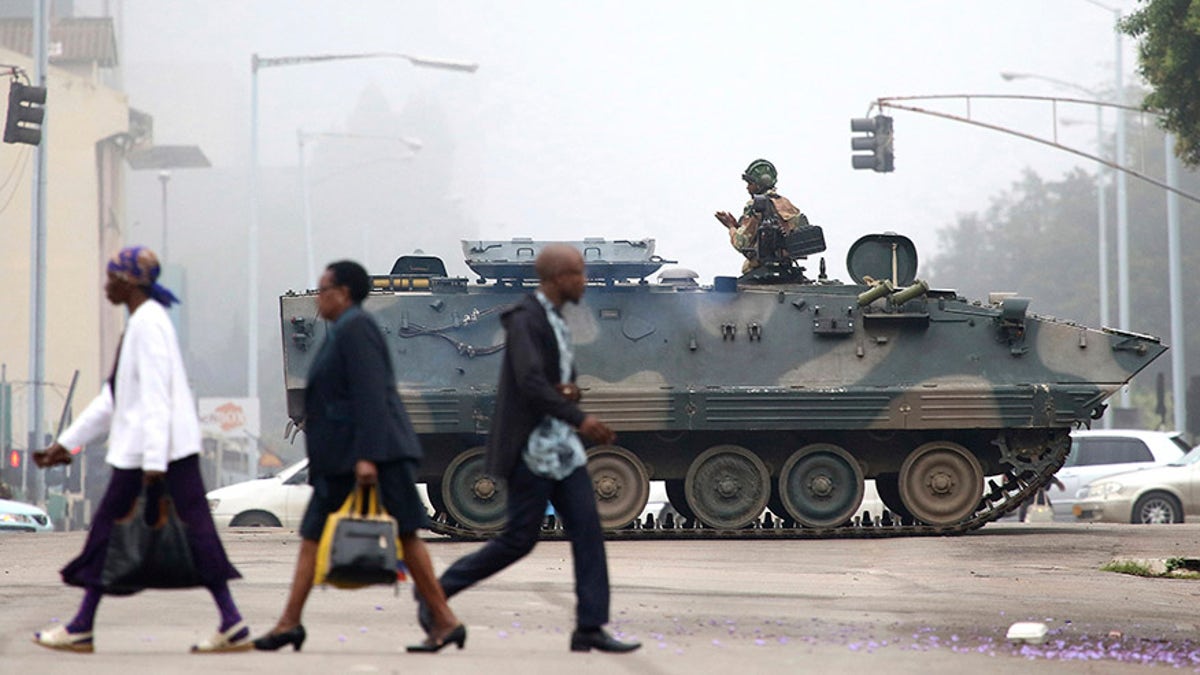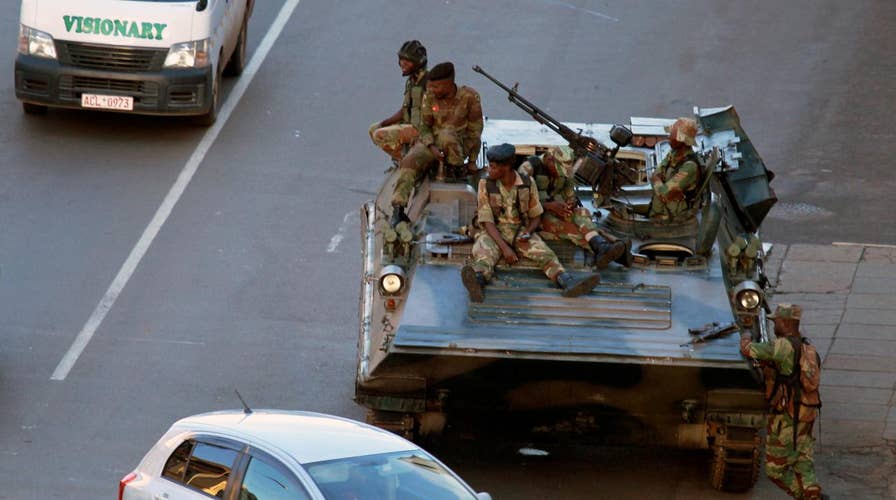Zimbabwe's future uncertain after military takes over
93-year-old President Robert Mugabe remains under house arrest; Rich Edson reports from the State Department.
The U.S. government urged the Zimbabwe military for an "expedient transition to democratic, civilian order" on Thursday amid ongoing political uncertainty that marks the likely end of President Mugabe's decades-long rule.
The U.S. Embassy in the capital city of Harare said in a statement that the U.S. government is “deeply concerned” by the actions taken by Zimbabwean military Wednesday that included putting Mugabe into military custody, reportedly with his wife Grace.
Mugabe was shown meeting Thursday with the army commander who put him under house arrest, as negotiations with a South African delegation and a Catholic priest at the state house pushed for a resolution to the political turmoil.
The state-run Zimbabwe Herald newspaper published what it called new photos of the meeting Thursday afternoon. It said details were to come.
“We call on the Zimbabwean military leaders to exercise restraint, respect the rule of law, uphold the constitutionally-protected rights of all citizens, and to quickly return the country to normalcy,” the U.S. Embassy's statement said.
“The United States encourages all Zimbabweans to resolve differences calmly and peacefully through democratic, transparent and constitutional processes, with proper respect for human rights and fundamental freedoms, including freedom of expression through any media, in order to move part this current crisis and towards a more stable future.”

President Robert Mugabe has been in power since 1980. (AP Photos)
The political turmoil plaguing in the southern African country as it combats nearly 90 percent unemployment came to a head last week when Mugabe fired Vice President Emmerson Mnangagwa, accusing him of plotting to take power, including through witchcraft.
Mnangagwa was seen as Mugabe's likely successor. His whereabouts are unknown after he fled the country last week, saying he feared for his safety and that of his family.
In an unprecedented move, the leader of the Zimbabwe army threatened to step in and take control if the purges against senior ruling ZANU-PF party officials continued.
Now in a political limbo, a range of voices have urged Mugabe to step aside so that country can transition into free and fair elections.
Southern African regional officials were meeting on the crisis in neighboring Botswana, and South African ministers had arrived in Harare for talks with the military and Mugabe.
However, the 93-year-old leader, whose ruled since its liberation from a white minority rule in 1980, reportedly remains defiant and insists he is the country’s only legitimate ruler, Reuters reported.
Catholic priest Fidelis Mukonori is acting as a mediator between Mugabe and the military’s generals who seized power on Wednesday.

The Zimbabwe army took control of the state run television and put Mugabe and reportedly his wife into military house arrest. (AP Photo)
According to Sky News, Mugabe is reportedly resistant to the idea of making a graceful exit and insists on serving out his full term.
A joint statement by more than 100 civil society groups urged Mugabe, the world's oldest head of state, to peacefully step aside and asked the military to quickly restore order and respect the constitution. A joint statement by churches also appealed for calm.
Soldiers manning the few checkpoints on roads leading into downtown Harare greeted motorists with a smile, searching cars without hostilities and wishing motorists a safe journey.
Street vendors who endured police raids after Mugabe ordered their removal were working without hassles. Trade unions urged workers to go about their business.
"The situation is quite OK because they are now returning to their jobs," said one Harare resident, Clinton Mandioper.
The Human Rights Foundation also urged the new government to show restraint.
“Zimbabwe has not had free and fair elections for decades,” said HRF president Thor Halvorssen in a statement on Wednesday. “Today, Zimbabwe’s de facto rulers have the opportunity to be on the right side of history. They can choose to go down a violent path and enthrone themselves as new dictators, or they can choose to facilitate a transition to democracy by refraining from violence, creating a broad interim governing coalition, and calling for free and fair elections in the short term.”
The Associated Press contributed to this report.








































